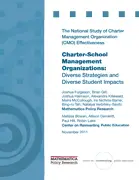Charter management organizations (CMOs), which establish and operate multiple charter schools, represent one prominent attempt to bring successes from the charter sector to scale. Many CMOs were created in order to replicate educational approaches that appeared to be effective, particularly among disadvantaged students. Attracting substantial philanthropic support, CMO schools have grown rapidly from encompassing about 6 percent of all charter schools in 2000 to about 17 percent of a much larger number of charter schools by 2009 (Miron 2010). Some of these organizations have received laudatory attention through anecdotal reports of dramatic achievement results.
The National Study of CMO Effectiveness aims to fill the gap in systematic evidence about CMOs, providing the first rigorous nationwide examination of CMO achievement effects. The study includes an examination of the relationships between the practices of individual CMOs and their effects on student achievement, with the aim of providing useful guidance to the field. Mathematica Policy Research and the Center on Reinventing Public Education (CRPE) conducted the study with funding from the Bill & Melinda Gates Foundation and the Walton Family Foundation, and project management assistance from the NewSchools Venture Fund. This report provides key findings from the study on CMO practices, impacts, and the relationships between them. This updated report also examines longer-term impacts of CMOs on high school graduation and college entry.









